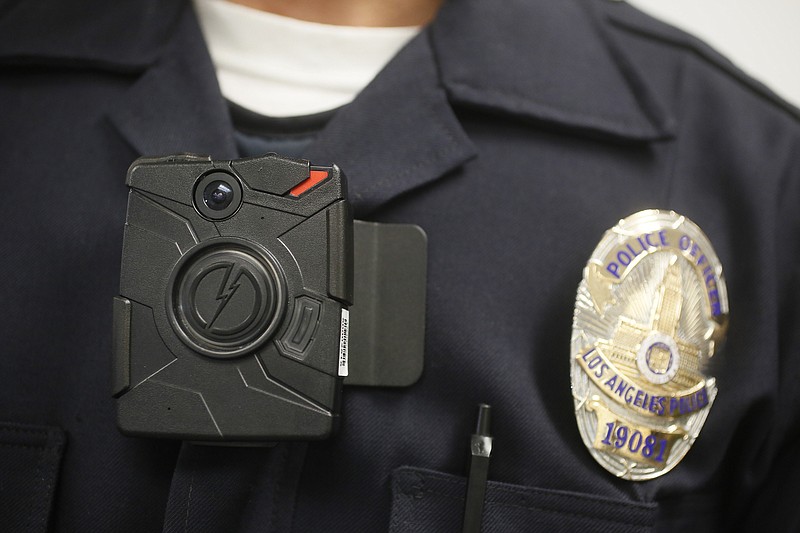A lack of available funding is creating a barrier for the Jefferson City Police Department to outfit officers with new radios and body-worn cameras.
JCPD Capt. Eric Wilde on Tuesday discussed the potential of purchasing new radios and body cameras with the Jefferson City Council Committee on Public Safety.
Wilde said the department is researching how much it would cost to outfit 70 of the department's 90 officers with body-worn cameras. The department's command staff would be excluded since they are less likely to be involved in incidents with the public.
"We've been doing a pretty in-depth study about body cameras and the best route to take, and it really comes down to two options - you can either purchase those cameras and all the hardware and storage that it takes to maintain it, or you can do what is basically a lease," Wilde said.
Both options have positives and negatives, he said.
Wilde estimates purchasing 70 body cameras, along with the storage equipment needed would be about $400,000. While this would cost less than leasing the cameras, the department would have to spend more money to maintain the inventory when cameras stop working and pay for storage for the data.
Wilde said the department also needs to replace cameras in patrol cars, and there are options to lease both types of cameras together which would help keep the technology connected.
Leasing the cameras would cost $750,000 to almost $1 million over a period of five years. However, cameras would be replaced on a two-year cycle and broken cameras could be sent in for repair. The deal also would include virtual cloud storage for the video.
"It's much more pricey, but I'd say the benefit of that is it's predictable," Wilde said. "You know what you're going to be paying over a five-year period, and you know you're always going to have cameras that are working."
Getting the body cameras is more of a question of "when" than "if," he said.
"We're committed; 100 percent in," Wilde said. "I've got officers here every day that wish that they had them, because more times than not the body camera is exonerating an officer from a frivolous complaint. It's just a matter of finding the funding to make it happen."
Wilde said the department will likely include the purchase of the cameras in its Capital Improvement Sales Tax H funding plan. The city is currently on Sales Tax G. Sales Tax H will be renewed in 2021 and would kick in the following year.
Ward 4 Councilman Carlos Graham, who is chairman of the Public Safety Committee, said he would request an update on the body camera process at future meetings.
The department also hopes to outfit all officers with a specific type of new radios that will allow them to participate in the Missouri Statewide Interoperability Network, which allows participating agencies to communicate with each other via radio.
JCPD is the only agency in the area without widespread ability to use MOSWIN. The Cole County Sheriff's Department, the Lincoln University Police Department, Capitol Police Department, Missouri Highway Patrol and Callaway County Sheriff's Office all have access, Wilde said.
In the past, if events such as a police pursuit moved from Jefferson City into a different agency's jurisdiction, JCPD had to go through both agencies' 911 centers to communicate the event.
"In perfect world, if we get into a pursuit here, we would be able to allow Callaway County to switch over to our MOSWIN channel to communicate with them directly during the entire event in progress," Wilde said.
Wilde said another benefit of the MOSWIN radios is allowing officers to scan other agencies traffic channels and allow them to keep an ear open for anything they might need to know as soon as they can.
The radios come in portable versions, carried on the officer's person, and mobile versions that go in the patrol cars. Currently JCPD has 15 of each, given to command vehicles and supervisors.
The 15 portable radios totaled $73,853, and the 15 mobile radios were $72,459.
Although they consider both to be important, Wilde said, the portable radios would be the first priority so each officer would have one on their person. The portable radios can be used wherever the officer is, unlike the vehicle-based mobile radios.
Wilde said purchasing another 75 portable radios to equip each officer would cost about $364,000.
The Jefferson City Fire Department also hopes to purchase new radios, Fire Chief Matt Schofield said Tuesday.
The department submitted the purchase of the new radios as its top priority funding request during the city's Fiscal Year 2021 budget process but did not receive funding. The request was for $158,000.
Schofield said they want to get a portable radio on each crew member's person as well.
Schofield said they have about $34,000 a year from the sales tax to use for purchasing fire equipment, and the department has been letting it roll over each year to be used for radios.
The department has about $130,000 to use for radios but is still short about $86,000.

